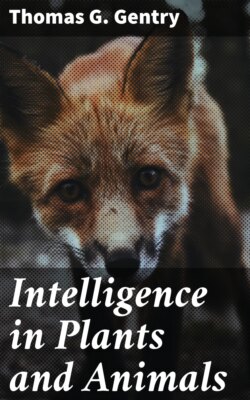Читать книгу Intelligence in Plants and Animals - Thomas G. Gentry - Страница 18
На сайте Литреса книга снята с продажи.
MILCH-COWS OF THE ANTS.
ОглавлениеTable of Contents
While much has been written upon the social relations subsisting between ants and aphides, yet the subject never grows uninteresting or threadbare. New facts are brought to light as observations widen and extend, some tending to confirm, and others to subvert old notions.
That aphides excrete a sweet, viscid, honey-like fluid, which affords food for many species of ants, has been long known to naturalists. Any one can convince himself of this truth if he will but put himself to the trouble of examining the leaves or branchlets of any plant at the proper season of the year. Scattered upon the foliage and tender twigs thereof will be found millions of aphides, and close beside them countless ants, that ever and anon will be seen to caress, by means of their antennæ, the little creatures for the sweets within their bodies. It has even been asserted that some species of ants keep aphides as human beings do cows, but this by the many has been doubted, or deemed imaginary.
When a young man the writer was disposed to drift with the popular opinion in this particular, but a few facts that fell under his notice whilst searching for carabi and other beetles that live under stones and decayed logs, changed the bias of his mind and established in him the idea that with one species of ant this was at least the case.
It was on an occasion while exploring a neighboring thicket for the objects of his search, that he discovered, underneath a large flat stone which he had raised, a nest of a small red ant, which he took to be the Lasius flavus of the books. The ground was covered all over with pits, and divers communicating roads, and round about were hundreds of ants, larvæ in various stages of development, pupæ and eggs, and innumerous flocks of a white aphis, all of which were being tenderly cared for by a large army of thoughtful nurses.
NEST OF LASIUS.
Neuters About Their Work.
No sooner did the intrusion occur than the colony was a scene of busy activity. Interested in what was before him, the writer seated himself upon a small mound overlooking the nest, where could be clearly observed the minutest details of ant-life. The neuters were everywhere to be noticed, but not a single male or female ant. All the work devolved upon the neuters. These were divided into three sets, each set having a definite part to perform in the unexpected drama before it. Some neuters had the exclusive charge of the mature larvæ, others of the pupæ and very young grubs, and the rest of their aphidian herds.
But it is to those that had the care of the aphides that we shall particularly invite attention. At the time of the disturbance, these specialized neuters were busy milking their cows, which they did by rubbing their long, pliant feelers against the anal nipples of the latter, drawing therefrom, as it seemed, a drop of the coveted fluid with each antennal stroke. No aphis was known to be visited in this business twice in succession, but the ants would go from one to another, and only return to the first when sufficient time had elapsed for the replenishing of its store. So intent were they upon their task, that several minutes must have passed before they took in the danger to which they were exposed.
You should then have seen their anxiety, and the presence of mind they exhibited. Conscious as of attack, and knowing the peril that beset them, they did not flee to their underground galleries, or to the adjoining grasses, for shelter, and thus leave their flocks to the mercy of the invader, but they manifested the deepest concern for the little creatures, so unable to defend themselves, that had so willingly catered to their temporal wants. Not an ant was seen to desert its post, but all remained on duty till the last of their protegés was carried to safe and comfortable apartments in the ground beneath.
What clearer evidence is wanted to show the love these neuters bear the tender objects of their care? It must be plain that man bestows not half the attention upon his flocks than do these ants on theirs. It is true they do not bring them food, but that they build their homes where food, the roots of herbs and grasses, abound, there is no doubt. It may be, too, that they are carried to their pasture-grounds, when that necessity occurs, but this cannot with truth be said. When some would stray, they were returned within the fold, which shows the watch these ants do exercise.
Concluding then, this much may be averred: food, wholesome, sweet, nutritious food, the aphides supply to ants, the neuters and the young, but specially the young. And that they lead most happy, prosperous lives, the ants their masters, must surely be, or looks deceive.
